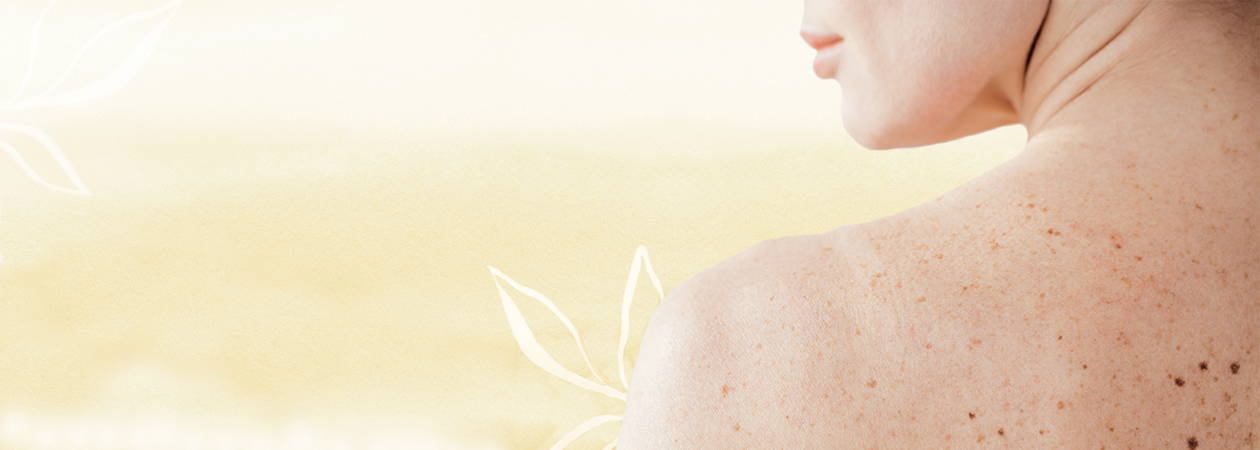
Acné, eczéma, rosacée...
explications et solutions
On parle souvent d’imperfections de peau mais rarement des problèmes et affections cutanés. Si certaines de ces affections sont liées à des pathologies, toutes ne sont pas incurables contrairement à ce que l’on croit ! De nos jours, les traitements sont de plus en plus nombreux pour à tout le moins atténuer et limiter les effets visibles qui portent atteinte à l’image de soi. Voilà un éclairage rapide qui explique et chasse les fausses idées sur ces problèmes de peau.

NABILA
Mars 2022
1. L'acné
1.1 QU’EST-CE QUE L’ACNÉ ?
L'acné est une maladie inflammatoire chronique du follicule pilosébacé qui est constitué d'un poil auquel est accolée une glande sébacée. Cette glande sécrète le sébum, substance très fluide qui s’écoule par les pores de la peau et la recouvre pour la protéger. Dans l’acné, le sébum est sécrété en excès et devient épais. Dans cet environnement riche en graisse, une bactérie habituellement présente sur la peau, le Propionibacterium acnes, se multiplie alors de manière anormale et entraîne l'apparition de lésions d'acné.
L’acné est très fréquente, atteint un stade sévère dans 15 à 20% des cas environ et touche en premier lieu les adolescents. L'acné de l’adulte, et plus particulièrement de la femme, peut être la conséquence d’un excès d'androgènes ou d’acné d’adolescence qui n’a pas guéri. Le visage est la zone la plus souvent touchée puis vient en deuxième lieu le dos.
Afin de proposer le traitement approprié, il faut d’abord comprendre et avoir connaissance des facteurs prédisposants. Tout d’abord et avant tout la génétique, une surproduction d'hormones androgènes entraînera une hypersécrétion de sébum (hyper séborrhée). Une alimentation riche en sucres et en gras est aussi un facteur accélérateur mais non une cause. La consommation de tabac et d’alcool sont aggravants de même que la pollution ou l’exposition aux UV.
Aucun traitement ne peut guérir efficacement cette pathologie mais certains réduisent l'apparition des signes cliniques. On en distingue 3 types selon le degré de gravité :
Les traitements topiques à application locale
Gels et pommades pour traiter l'acné légère à modérée qui agiront soit par action bactéricide soit par limitation du processus de différenciation cellulaire.
Les traitements oraux
Prescrits en cas d'acné moyennement sévère vont agir au niveau hormonal.
Les traitements antibiotiques
En cas d'acné sévère, des traitements antibiotiques oraux peuvent être prescrits, en association avec un traitement topique.
1.2 COMMENT PRENDRE SOIN DE SA PEAU EN PRÉSENCE D'ACNÉ ?
Pour ce faire, il existe des substances qui ont une action régulatrice de la sécrétion sébacée, une action purifiante et une action astringente.
Pour l’action régulatrice, sachez qu’une carence en vitamines B2, B6 et B8 provoque une augmentation de la sécrétion sébacée. Un complément en ces vitamines et/ou la consommation de gelée royale (riche en ces vitamines B) seront les bienvenus. Une supplémentation en zinc va également permettre de diminuer la sécrétion de sébum. Et enfin, l’acide linoléique -Oméga 3- est très prisé pour son action régulatrice et donc particulièrement précieux pour les peaux acnéiques. Pour rappel, les actifs de notre sérum redensifiant sont particulièrement riches en cet Oméga 3.
Les argiles sont très précieux pour viser l’action purifiante, ils permettent de fixer l’huile. Notre masque lumière sera donc bien recommandé. L’application d’un soin au bénéfice astringent est essentiel pour resserrer les pores et limiter la sécrétion de sébum et la prolifération microbienne.
Il est primordial de veiller à l’hygiène de la peau en lavant régulièrement le visage avec un pain sans savon pour éviter que la peau ne se dessèche. Le sébum est précieux à la peau, il ne faut pas s’acharner à l’éliminer. Il possède, en plus de son rôle de barrière protectrice réduisant la déshydratation, des propriétés antibactériennes liées à l'action de ses acides oléiques et palmitoléiques, ainsi que des propriétés antioxydantes conférées par la vitamine E. Il est faux de penser que les peaux grasses ou à tendance acnéique n’ont pas besoin du tout d’hydratation. L’application d’une crème hydratante légère et matifiante est nécessaire.
Il n’est pas possible de vous lister les soins à conseiller ou à proscrire mais sachez qu’en règle générale, il faut privilégier les soins chargés en actifs apaisants et anti-inflammatoires et proscrire ceux renfermant des tensioactifs puissants (produits démaquillants forts), des huiles minérales ou des huiles végétales comédogènes telles l’huile de germe de blé, de coco, de cacao, de lin ou encore de rose musquée. L’usage de notre lotion Pure Merveille soulagera l’acné grâce à la présence de jus frais d’Aloe vera qui permet de réguler l’excès de sébum et d’exercer son action anti-inflammatoire.
Les huiles essentielles de romarin et de lavande sont recommandées pour traiter l’acné, raison de plus pour laquelle notre sérum redensifiant, Elixir bonheur, fera le plus grand bien aux peaux acnéiques.
Il faut éviter le soleil qui dans un 1er temps induit une amélioration mais suivie juste après d’une flambée. Dans la mesure du possible le fond de teint ou autres produits de maquillage. Aux hommes, il est conseillé de laver abondamment le visage avant le rasage et d’éviter toute lotion après rasage contenant de l’alcool.
Les compléments alimentaires renfermant du zinc ou de la levure de bière ou encore des extraits de certaines plantes telles que la bardane, la pensée sauvage, l’avoine (en particulier à l’adolescence) et la sauge (en particulier à la ménopause) sont d’un grand secours pour soulager l’acné.
2. la rosacée (couperose)
2.1 QU’EST-CE QUE LA ROSACÉE (OU ACNÉ ROSACÉE) ?
La rosacée est une maladie chronique qui affecte les petits vaisseaux du visage et évolue par poussées. Elle est assez fréquente et touche plus souvent les femmes, en particulier celles à peau claire. Contrairement à ce qu’on pense, ces rougeurs ne sont pas liées à un excès de consommation alcoolique, cette fausse idée rend d’ailleurs la maladie socialement difficile à vivre, en particulier par les femmes.
Il existe plusieurs formes à des degrés de sévérité plus ou moins élevés. La forme la plus fréquente est la couperose qui se manifeste par des rougeurs essentiellement au centre du visage hors pourtour des lèves et des yeux. Dans les formes sévères, ces rougeurs s’accompagnent de papules et pustules. La consommation d’alcool, l’exposition au chaud, au froid ou encore le stress sont des facteurs aggravants.
Les traitements médicaux, via des crèmes ou des antibiotiques, se révèlent souvent efficaces à condition qu’ils soient réguliers et bien respectés. Les traitements par laser contribuent aussi, en parallèle, à effacer les rougeurs.
2.2 COMMENT PRENDRE SOIN DE SA PEAU EN PRÉSENCE DE ROSACÉE ?
Sur le plan diététique, les boissons très chaudes, les aliments épicés et l’alcool sont à fuir. Il faut éviter toute exposition au soleil et se prémunir toujours d’une protection totale.
En termes d’hygiène, le savon est proscrit au profit d’une lotion nettoyante douce à base d’actifs hydratants telle notre lotion multi actions Pure Merveille. Des crèmes fluides et légères sont conseillées pour assurer l’hydratation indispensable à ces peaux sans obturer les pores de la peau. Les poudres ou fonds de teint gras seront bien sûr à proscrire.
3. L’ECZÉMA ET LE PSORIASIS
3.1 QU’EST-CE QUE L’ECZÉMA ?
L’eczéma est une maladie inflammatoire chronique qui se caractérise par une déficience de la barrière cutanée et une anomalie de la réponse immunitaire. La filaggrine, une protéine clé qui intervient dans la rétention d’eau, n’assume plus correctement sa fonction d’où une altération du film hydrolipidique qui prive l’épiderme de sa fonction de barrière.
La peau est alors démunie de ses lipides protecteurs et s’assèche par suite d’évaporation de son eau. Elle absorbe ainsi plus facilement allergènes et autres agents irritants et devient plus sensible et sujette au déclenchement d’une réaction inflammatoire. C’est la maladie de peau qui touche le plus de personnes après l’acné. Elle se manifeste par des plaques rouges et des démangeaisons intenses avec des fissures et des croûtes. Une bonne hydratation est donc primordiale avant même d’avoir recours au remède de la crème à la cortisone pour soulager l’eczéma.
3.2 QU’EST-CE QUE LE PSORIASIS ?
Comme l’eczéma, le psoriasis est la conséquence d’une dermatose inflammatoire chronique. Elle évolue par poussées entrecoupées de phases de rémission et se manifeste par des plaques rouges surmontées de squames blanchâtres accompagnées généralement de démangeaisons. Cette inflammation se traduit par un renouvellement accéléré de la peau - 3 à 4 jours au lieu des 28 jours pour une peau saine - et se localise le plus fréquemment au niveau des coudes, genoux, cuir chevelu, derrière les oreilles et dans la région lombo-fessière.
L’importance du protocole d’hydratation et de manière générale l’observance, c’est à dire le strict respect de la prescription médicale, est indispensable à l’efficacité du traitement de cette maladie. Les formes modérées à sévères de psoriasis nécessitent une prise en charge psychologique car le sentiment de solitude chez les personnes atteintes de psoriasis est largement répandu.
Il n’existe à ce jour aucun traitement pour guérir définitivement l’eczéma ou le psoriasis. Seul le dermatologue pourra conseiller le traitement adéquat en fonction du niveau de gravité de la pathologie.
De manière générale, l’hydratation reste un facteur clé dans tous ces types d’affections cutanées et ce quelle que soit l’affection.



